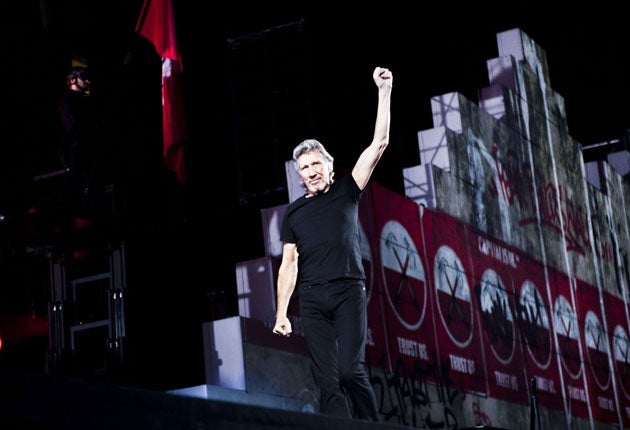The Wall: A sprawling masterpiece that's built to last
After 30 years, Pink Floyd's The Wall is back on the stage. Roger Waters tells Pierre Perrone about its enduring appeal

Your support helps us to tell the story
From reproductive rights to climate change to Big Tech, The Independent is on the ground when the story is developing. Whether it's investigating the financials of Elon Musk's pro-Trump PAC or producing our latest documentary, 'The A Word', which shines a light on the American women fighting for reproductive rights, we know how important it is to parse out the facts from the messaging.
At such a critical moment in US history, we need reporters on the ground. Your donation allows us to keep sending journalists to speak to both sides of the story.
The Independent is trusted by Americans across the entire political spectrum. And unlike many other quality news outlets, we choose not to lock Americans out of our reporting and analysis with paywalls. We believe quality journalism should be available to everyone, paid for by those who can afford it.
Your support makes all the difference.Ihad this idea to do a show where the band is on stage and, while they're playing, you build a wall in front of them until it's finished and that would be the end," says Roger Waters about the concept album he wrote for Pink Floyd at the end of the Seventies. "Everyone said I was completely insane. I thought maybe we could tear the wall down at the end and there could be light at the end of the tunnel."
First released at the end of 1979, The Wall was an anachronism in the post-punk musical landscape, a tax exile album recorded in the south of France and Los Angeles, a sprawling double-vinyl set trying to make sense of Waters' feelings as the Floyd became one of the biggest groups on the planet after the triumph of The Dark Side of the Moon. The composer and multi-instrumentalist was so incensed by the boorish behaviour of fans at Montreal's Olympic Stadium in 1977 that he lost his temper and spat at one of them.
That incident provided the foundation of The Wall. "I started to explore this idea that there are incidents in every individual life that become the bricks that we use to build a wall around ourselves. If you build a wall because you're frightened, you become isolated," explains Waters.
Many elements helped build and cement The Wall, as the concept evolved from the personal to embrace universal themes. "When I wrote it, it was mainly about me, a little about Syd Barrett as well," says Waters, who last saw the Floyd's original frontman during the recording of Wish You Were Here in 1975.
The ghost of Barrett wasn't the only one haunting The Wall. Eric Fletcher Waters, Roger's father, who was killed at Anzio in 1944 during the Second World War, also loomed large. "At the beginning of the war, my father was a conscientious objector so he drove an ambulance," reveals Waters. "Then he joined the Communist Party, went back to the conscription board and said that he was ready to kill people as Hitler had to be stopped. That is the only consolation in my father's death. Now I see young men going off to fight what seem to be unnecessary wars in Iraq and Afghanistan."
Indeed, the anti-war message has moved centre stage in Waters' new presentation of The Wall with the projections of pictures of fallen loved ones he has invited fans to send to his website. "I now see The Wall as an allegory for the way nations act towards one another. But, with social media and the internet, it is easier for us to see that accidents of geography and birth are the only differences between us all and to resist."
The Wall has proved a remarkably adaptable, and prescient concept. In 1982, Alan Parker directed a film version with Bob Geldof as Pink, and in 1990, Waters staged a highly symbolic performance in Berlin in front of 400,000 people, eight months after the fall of the Berlin Wall.
The new production, which opens at the O2 in London tonight, still features the giant puppets created by Gerald Scarfe, but greatly benefits from the advances in technology since The Wall was first staged for only 31 performances in four cities in 1980 and 1981. "It was incredibly difficult to do and we lost a lot of money doing it. Now people spend a lot more on concert tickets than they used to," explains Waters. "Back then, we had three rickety old 35mm sprocketed film projectors stuck out in the audience. Now we have 15 video projectors hung on trusses and we can project across 240ft. There's just way more imagery. It's like showing a movie on a football field."
Waters now hopes to take The Wall to Broadway or the West End.
Roger Waters: The Wall Live, O2 Arena, London ( www.roger-waters.com) tonight to 18 May; then touring
Join our commenting forum
Join thought-provoking conversations, follow other Independent readers and see their replies
Comments